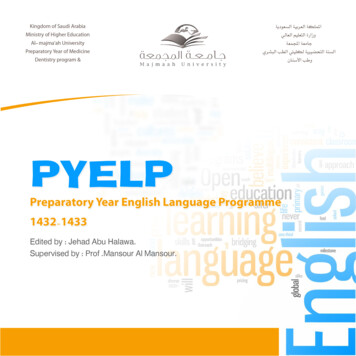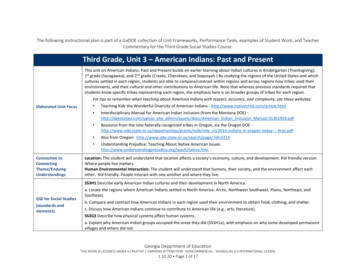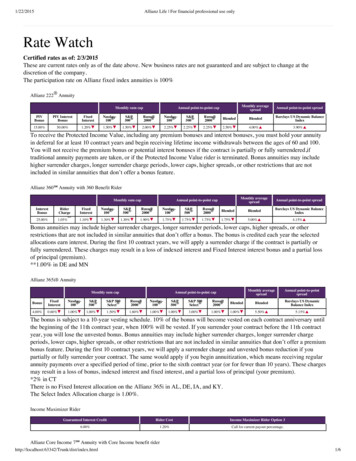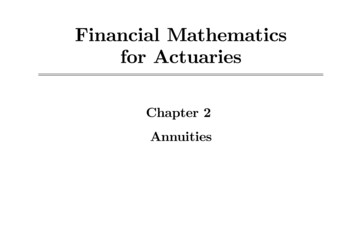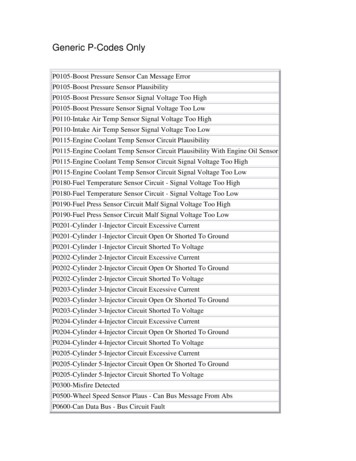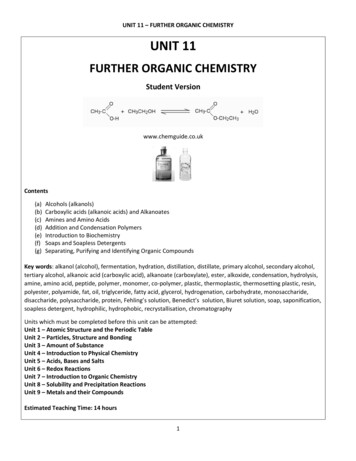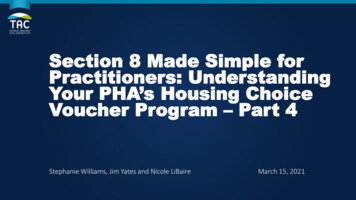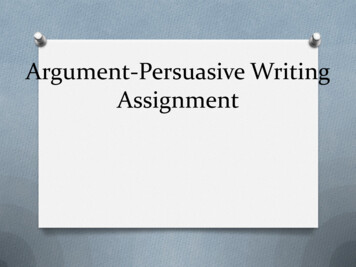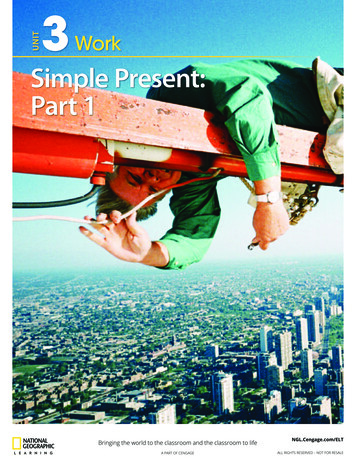
Transcription
UNIT3 WorkSimple Present:Part 178Simple preSent: pArt 150192 GE1 U03 078-115 rev06.indd 786/7/14 2:52 PM
A worker on top of the John Hancockskyscraper in Chicago, Illinois, USALesson 1Lesson 2Lesson 3Lesson 4 Review the Grammarpage 80page 88page 97page 104Simple Present:AffirmativeStatements;Irregular Verbs:Do, Go, and HaveSimple Present:NegativeStatements;Prepositions ofTime (part 2);Like, Need, WantVerbs Objects; ImperativesObject Pronounspage 111Connect theGrammar to Writingpage 11479
LESSON 1Simple Present: Affirmative StatementsEXPLORE1 READ the article about Doctor Bugs. Notice the words in bold.CD1-30Doctor BugsMost people don’t like bugs, but Doctor Mark Moffet lovesthem! In fact, his nickname is Doctor Bugs. He’s a photographerand an entomologist. An entomologist studies bugs.Doctor Moffett’s favorite bug is the ant. He goes all over theworld to study ants. He watches them as they eat, work, rest,sleep, and fight.He takes photographs of the ants. He lies on the ground withhis camera and waits for the right moment. The ants and otherbugs often bite him, but that doesn’t stop Doctor Bugs. He has aninteresting and unusual job, and he loves it!80Simple preSent: pArt 1Doctor Mark Moffett
2 CHECK. Read the list of verbs in the chart. Who does each action? Check ( ) the correctcolumn.VerbsDoctor MoffettAnts1. studies2. fight3. waits4. bite3 DISCOVER. Complete the exercises to learn about the grammar in this lesson.A Look at the list of verbs in exercise 2. Then find other verbs in the article from exercise 1.Doctor MoffettgoesAntseatB Look at the char s from exercise 2 and exercise A. Choos the correct answereach sta ement. Then discuss your answers with your clmates ateachermplete1. The verbs under Doctor Moffett end in -s / do not end in -s.2. The verbs under Ants end in -s / do not end in -s.Leaf cutter antsUnit 3leSSOn 181
LEARN3.1Simple Present: Affirmative StatementsSubjectIYouWeYouTheyTom and SueVerbworkSubjectevery day.HeSheItMy brotherVerbworksevery day.1. Use the simple present to talk abouthabits or routines, schedules, and facts.Habit or Routine: I exercise every day.Schedule: She starts work at eight.Fact: It rains a lot in April.2. Add -s to the verb for he, she, it, andsingular subjects.He drives to work.She works in an office.The bank opens at 9:00 a.m.3. Do not put be in front of another verb inthe simple present. He works at a bank. He is work at a bank.4 Circle the correct form of the verb to complete each sentence.1. Doctor Moffett love / loves his job.2. He study / studies ants.3. A salesperson sell / sells products for a company.4. You and Anita work / works on weekends.5. Nurses help / helps people.6. We write / writes science books.7. Our office close / closes at 7:00 p.m.8. She take / takes classes at the business school.9. You walk / walks to work every day.10. I start / starts work at 8:00 a.m. every morning.5 WRITE & SPEAK. List three activities you do often. Share your sentences with a partner.Then tell the class about your partner.Student A: I study. I play games. I talk with my friends.Student B: Maria studies. She plays games. She talks with her friends.82Simple preSent: pArt 1
6 Complete each sentence with the correct form of the verb in parentheses.1. A zookeeperfeeds(feed) animals.2. Computer programmers(write) software.3. Photographers4. A chef(take) photos.(cook) food.5. A firefighter(fight) fires.6. Musicians3.2(play) instruments.7. A farmer(work) on a farm.8. A dancer(dance).A zookeeper feeds arhino at the SedgwickCounty Zoo in Wichita,Kansas, USA.Simple Present Spelling Rules: -s and -es Endings1. Add -s to most verbs.close– op–stopstake–takeswrite–writeswork–works2. Add -es to verbs ending in -sh, -ch, -s, -x,and x–relaxesbuzz–buzzes3. Change -y to -i and add -es to verbsending in a consonant y.carry–carriescopy–copiesstudy–studiesSee page A2 for additional spelling rules for -s, -es, and -ies endings.Unit 3leSSOn 183
7 Write each verb with the correct -s, -es, or -ies ending.1. studystudies8. help2. fish9. miss3. pass10. fly4. worry11. fix5. explore12. watch6. bite13. like7. buy14. payIrregular Verbs: Do, Go, and Have3.3SubjectVerbIYouWeYouTheydothe dishes every day.goto work at 7:00 a.m.havedinner at 6:00 a.m.SubjectThe verbs do, go, and have are irregularfor he, she, it, and singular subjects.HeSheItVerbdoesthe dishes every day.goesto work at 7:00 a.m.hasdinner at 6:00 a.m.She goes home at six-thirty.He has a meeting at two-thirty.John does the laundry on Sunday night.8 Complete the paragraphs with the correct form of the verbs in parentheses.Manuel and Lila VegaManuel and Lila Vega (1)have(have) a busy lifestyle. Manuel is a doctorat a hospital. He works at night, so he (2)(go) to work at 7:00 p.m. andcomes home at 7:00 a.m. His wife Lila works at a bank. She (3)(go) to workat 8:00 a.m. and comes home at 6:00 p.m. They don’t see each other a lot during the week.Manuel and Lila also (4)morning they all (5)(have) two children, Luis and Carla. Every(have) breakfast together at 7:30. Then, Luis and Carla(6)(go) to school, and Lila (7)(8)(do) the dishes, and then (9)usually (10)Luis (11)he (12)(13)Simple preSent: pArt 1(go) to bed. Carla(do) her homework at a friend’s house in the afternoon, and(have) soccer practice. Manuel gets up at 4:00 p.m. At 6:00 p.m.,(have) dinner with Lila, Luis, and Carla. After dinner, he(go) to work. Manuel and Lila (14)a busy schedule during the week, but on weekends they relax.84(go) to work. Manuel(have)
PR ACTICE9 Complete the paragraph with the correct form of the verbs in parentheses. Then listen andcheck your answers.CD1-31Bush PilotsBush pilots (1)have(have) interesting jobs. They (2)(fly)special planes to Alaska’s bush country. (This is a wild area, far away from cities with airports.)Bush pilots (3)(4)(carry) people or supplies in their bush planes. They also(help) rescue people.Paul Claus is a famous bush pilot. He (5)(have) a lot of experience,and he is an excellent pilot. Paul also (6)(7)(own) a hotel in Alaska. He(fly) customers to his hotel and (8)adventures. He (9)(take) them on(go) to interesting places with them. It’s an exciting job!Bush planes on a glacier inDenali National Park, Alaska, USA10 EDIT. Read the paragraph. Find and correct five more errors with the simple present.sBill is a mechanic. He know a lot about cars. He work at a garage. He fix cars andtalks to customers. They asks questions about their cars. Bill works from 8:00 a.m. to6:00 p.m. every day. He haves a busy schedule, but he like his job very much.11PRONUNCIATION. Read the chart and listen to the examples. Then complete the exercises.CD1-32prOnUnCiAtiOnSimple Present -s and –es EndingsThe ending of third-personsingular verbs has threesounds: /s/, /z/, / z//s/walks1. Say /s/ after /p/, /t/,/k/, and /f/ sounds.stop-stops2. Say /z/ after /b/, /d/,/g/, /l/, /m/, /n/, / /, /r/,/v/, and / / sounds,and after vowel messpin-spinssing-singshear-hears3. Say / z/ after verbs thatend in /s/, /z/, / /, /t /,/d /, and watch-watches relax-relaxes/z/paysput-puts/ spay-paysgo-goesSee page A4 for a guide to pronunciation symbols.Unit 3leSSOn 185
CD1-33A Read the sentences about Rick’s schedule. Then listen and circle the sound you hear for theverb in each sentence.Rick’s Schedule1. Rick wakes up at 6:15 a.m. every morning./s//z// z/2. He jogs for an hour in the park./s//z// z/3. Then he takes a shower./s//z// z/4. He brushes his teeth./s//z// z/5. He eats breakfast at 7:45./s//z// z/6. He reads the newspaper./s//z// z/7. He washes the dishes./s//z// z/8. Then he drives to work./s//z// z/9. He starts work at 8:30./s//z// z/10. He goes home at 5:30./s//z// z/11. He relaxes on Saturday and Sunday./s//z// z/12. He loves weekends!/s//z// z/B Work with a partner. Practice reading the sentences from exercise A. Pay attention to thepronunciation of the –s and -es endings.12 LISTEN & SPEAK.CD1-34A Look at the list of activities in the chart. Then listen to the conversation between two teachers.Who does each activity? Check ( ) the correct column(s).Alvaro1. lives in EcuadorGalina 2. lives in Russia3. teaches at a university4. teaches at a high school5. teaches biology6. gets up early7. goes home at 3:00 p.m.8. goes home at 6:00 p.m.9. meets with students after class10. relaxes on SaturdayB Compare your answers from exercise A with a partner. Then practice saying sentences aboutAlvaro and Galina. Use the information from the chart.Alvaro lives in Ecuador.86Simple preSent: pArt 1
C In your notebook, write sentences about Alvaro and Galina. Use the chart from exercise A tohelp you.Alvaro lives in Ecuador.13 READ, SPEAK & WRITE.A Read the e-mail about Rosa’s new job. Guess her job. Then discuss your idea with a partner.To: Sato, AkikoSubject: New Job!Hi Akiko,Good news! I have a new job. I work for an office supply company. I have a busy schedule, butI love the work. On Monday, I go to the office. I meet with my boss and plan my schedule for theweek. I visit customers and sell our products during the week. I drive to different cities here in NewYork. I also fly to California every month. I work really hard, but the job pays well, so I’m happy.See you soon!RosaB Write five sentences about Rosa’s new job. Use the information from the e-mail in exercise A.Rosa goes to the ofce on Monday.14 APPLY. In your notebook, write a paragraph abouta friend’s or family member’s job. Do not write thename of his or her job. Use the model to help you.My cousin Maya has an interesting job.She has ballet class every morning. Then,she goes to the gym and exercises for twohours. She has a short break after lunch,and then she practices her dances. Shegives performances on the weekends.A ballet dancerB Work with a partner. Exchange paragraphs and tryto guess the person’s job.Unit 3leSSOn 187
LESSON 2Simple Present: Negative Statements and ContractionsEXPLORE1 READ the article about life on the International Space Station. Notice theCD1-35words in bold.Life on the Space StationAstronauts on the International Space Station have a busy schedule. Every day theywake up at 7:00 GMT.1 From 7:00 to 8:00, they wash up and eat breakfast. At 8:00 in themorning, they call Ground Control2 in their countries. After they talk to Ground Control,their workday begins. The astronauts don’t do the same thing every day. Their scheduleschange every week.The astronauts don’t work all the time. Each day they exercise for an hour in themorning and an hour in the afternoon. After dinner, they have free time. Then, it’s timeto go to sleep. Sometimes this isn’t easy because the sun rises and sets 16 times each dayon the space station.The astronauts’ work doesn’t end on Friday. They work a half day on Saturday andall day on Sunday. Astronauts are very busy people.881GMT: Greenwich Mean Time2Ground Control: People on Earth who work with astronauts in space.Simple preSent: pArt 1
The center of the Whirlpool Galaxy2 CHECK. Match each of the astonauts’ activities with the correct time.1. They wash up and have breakfast.da. at 8:00 in the morning2. They talk to Ground Control.b. after dinner3. They exercise.c. on Saturday4. They have some free time.d. from 7:00 to 8:00 in the morning5. They need to work a half day.e. for an hour in the morning and an hour inthe afternoon3 DISCOVER. Complete the exercises to learn about the grammar in this lesson.A Find these sentences in the article from exercise 1. Write the missing words.1. The astronauts don’t2. Astronauts don’tthe same thing every day.all the time.3. The astronauts’ work doesn’ton Friday.B Look at the sentences from exercise A. Then circle T for true or F for false for each statementbelow. Discuss your answers with your classmates and teacher.1. Use the base form of the verb after don’t.TF2. Add an -s to the base form of the verb after doesn’t.TFUnit 3leSSOn 289
LEARN3.4 Simple Present: Negative StatementsSubjectIYouWeYouTheyDo Not/Don’tBase Formof Verbdo notdon’twork.SubjectHeSheItBe careful! In negative statements withdoes not or doesn’t, do not add -s tothe base form of the verb.Does Not/Doesn’tBase Formof Verbdoes notdoesn’twork. She doesn’t exercise every day. She doesn’t exercises every day.4 Circle doesn’t or don’t to complete each sentence.1. An astronaut on the International Space Station doesn’t / don’t have a lot of free time.2. Astronauts doesn’t / don’t work all day on Saturday.3. An astronaut doesn’t / don’t have the same schedule every day.4. We doesn’t / don’t work on weekends.5. I doesn’t / don’t work in an office.6. My office doesn’t / don’t have a window.7. She doesn’t / don’t travel for her job.8. You doesn’t / don’t have a busy schedule.5 Change each affirmative statement to a negative statement.1. My brother has a job.My brother doesn’t have a job.2. I drive to work.3. Pilots fix planes.4. Our teacher does homework.5. I go to the gym in the morning.6. We have class on Sunday.7. You teach biology.8. We have an exam on Saturday night.90Simple preSent: pArt 1
6 SPEAK. Work with a partner. Make negative statements with the words below.I workMy mother studyMy father exerciseMy drive to class/workStudent A: I don’t drive to class.Student B: My mother doesn’t study.3.5 Prepositions of Time (Part 2)1. Many time expressions are prepositionalphrases. A prepositional phrase is apreposition a noun.Preposition Nounat three-thirtyin the afternoonat nighton Sunday2. remember: Use at with specific timesand in the phrase at night.The bank opens at nine o’clock.We relax at night.Use in with morning, afternoon, andevening.We go to work in the morning.We eat dinner in the evening.Use on with days of the week andspecific dates.I don’t work on Saturday.The meeting is on Monday afternoon.His birthday is on November 25th.3. To show when an activity begins andends, use from . . . to.She works from nine to five-thirty.4. Use until to talk about an activity thatcontinues up to a specific time.The bank is open until four o’clock.5. A sentence can have more than oneprepositional phrase.He wakes up at five-thirty in the morning.For Prepositions of Time (Part 1), see Unit 2, Lesson 3.reAl enGliSHTo be less specific, we use around and about.7 Underline the prepositional phrases inthese sentences.1. We have class from 9:40 to 10:50.We usually eat dinner at about 8:00. (Wedon’t eat exactly at 8:00 every night.)I usually leave work at around 6:00. (I don’tleave work at exactly 6:00 every night.)2. On Wednesday, I have class until 3:30.3. The party is on Saturday night.4. The meeting doesn’t end until 3:00.5. My workweek is from Monday to Friday.6. I work from 9:00 to 7:00 on Tuesday and Wednesday.7. I don’t work on weekends.8. She doesn’t get home until 4:00 in the afternoon.Unit 3leSSOn 291
8 Complete each sentence with the correct preposition(s).at1. She worksnight.2. The meeting isWednesday afternoon.3. I sleep9:304. I workMonday5. Class startsthe morningFriday.8:306. We studySaturday.the morning.night.7. The library is openeleven o’clock8. I have lunch12:009. She goes to bednight.1:00 every day.1:00 a.m.10. We have a break10:30Friday and Saturday.10:45the morning.9 WRITE & SPEAK. Complete the sentences with prepositional phrases of time. Use theprepositions from chart 3.5 on page 91. Then share your sentences with a partner.1. I have breakfastat 7:00.2. English class starts5. I have dinner3. We have class from3.6 Like, Need, and Want ywantHewantsInfinitiveto exercisein the morning.to relaxtoday.to meetevery week.1. An infinitive is to the baseform of the verb.He likes to play soccer.2. Some verbs are followed byinfinitives.We want to play soccer.She needs to call her boss.I like to read. We want to leave. We want leave.92Simple preSent: pArt 14. I have lunch
10 Put the words in the correct order to make sentences.1. Saturday / to / work / They / need / onThey need to work on Saturday.2. He / have / lunch / wants / at / 1:00 / to3. tonight / to / need / work / until / 7:00 / You4. need / buy / I / to / computer / a / new5. She / play / to / likes / tennis6. want / watch / to / the game / We7. to / He / study / in the library / likes8. need / I / do / my homework / to9. need / I / my / call / mother / to10. ask / to / wants / a / She / questionPR ACTICE11SPEAK.A Work with a partner. Complete the sentences with information about yourself. Useprepositional phrases, the simple present, and infinitives.I get up . . .I like . . . on weekends.I have breakfast . . .I need . . . today.On weekends, I sleep until . . .I do my homework . . .I go to bed . . .I want to . . .Student A: I go to bed at midnight.Student B: I do my homework in the morning.B Work in a group. Say three sentences about yourpartner. Use the information from exercise A.Student A: Sun-hee does her homework in the afternoon.reAl enGliSHUse on weekends to talk aboutactivities that happen everyweekend or on most weekends.We relax on weekends.She doesn’t work on weekends.Student B: Walid goes to bed at midnight.Student C: Maria likes to relax on Sundays.Unit 3leSSOn 293
12 READ, WRITE & SPEAK.A Read the information about Lia. Then complete the sentences in the chart below with thecorrect form of the verbs in parentheses and the correct prepositions of time.Lia is from Indonesia. She works in Toronto, Canada. This is her first time awayfrom home, and she misses her life in Indonesia. Her life is very different in Canada!In Indonesiacooks1. Lia’s mother(cook) breakfast for her.2. LiaMonday to Saturday.(have) classes3. Lia(go) out with her friends9:3012:30 fromweekends.In Canada4. Lia’s mother5. Lia7:15(not cook) breakfast for her.(have) breakfast at a coffee shopthe morning.6. Lia7. She5:00(not have) classes(work)Monday8. She also9. She9:0010. Liaaboutthe morning.9:00Friday.(study) at a business school because she(want to) start a business in Indonesia someday.night(have) a class6:00Tuesday and Thursday.(not have) many friends in Toronto.11. She(not go) out12. She(be) lonely.13. She(miss) her friends in Indonesia.weekends.B Is your life similar to Lia’s life, or is it different? Complete the sentences with information aboutyour life.1. My life is (similar to / different from) Lia’s life. In the morning, I.2. During the day, Ifrom3. At night, I4. Ito.friends in.5. On weekends, I6. I.lonely.C Work with a partner. Share your sentences from exercise B.My life is different from Lia’s life. In the morning, I have breakfast at home.94Simple preSent: pArt 1.
13 EDIT. Read the paragraph. Find and correct six more errors with negatives and prepositionsof time.Iris is a reporter. She works for a newspaper. She asks questions and writes articles.doesn’tShe don’t drive to work. She walks. She don’t work in the morning. She works from 2:00 p.m.in 11:00 p.m. She doesn’t goes to bed early. She goes to bed on 1:00 a.m. She doesn’t work atSaturday and Sunday. She relaxes in weekends.CD1-3614 Complete the conversation below. Use words from the box. You can use some words morethan once. Then listen and check your answers.workhavefromattoinonUse How about . . .? to makesuggestions.Ted:Hi, Jana!Jana:Hey, Ted! How about coffee sometime? (1) I’m freeinTed:Jana:reAl enGliSHthe morningonA: Hi. How about coffee thisafternoon? I’m free at 4:00.Thursday.(2) Iclass in the morning.(3) How about2:00?B: Sorry. I work from 9:00 to 5:00.How about Saturday afternoon?soccer practiceSorry. I’m not free then. (4) I2:004:00. How about Saturday?Ted:I’m sorry. (5) Ion Saturday9:005:00.How about Sunday afternoon?Jana:Sure. That sounds good. (6) How aboutTed:Great. See you then!2:00?15 SPEAK. Work with a partner. Partner A, look at the schedule on this page. Partner B, lookat the schedule on page A5. Do not show each other your schedules. Find a time to meetfor coffee. Use the suggestions and answers from the chart below.partner A’sStA’s ScheduleSc d lWeek 18, MayThursdaySuggestionsFriday9 AM - 10 AM10 AM - 11 AMclasswork11 AM - 12 PMHow about coffeesometime?How about (time of day) ?How about (time) ?OK. See you then.12 PM - 1 PM1 PM - 2 PMAnswersSure. That sounds good.I’m sorry. I have(class / practice /work / a meeting).Great.class2 PM - 3 PM3 PM - 4 PMwork4 PM - 5 PMUnit 3leSSOn 295
16 LISTEN & SPEAK.CD1-37A Listen to the information about workweeks around the world. Check ( ) the workdays foreach country in the chart.MTWThFSatSunCanadaUnited StatesThailandAustriaSaudi ArabiaUnited ArabEmiratesJapanIndiaB Work with a partner. Use the information in your chart from exercise A to make true and falsestatements. Say a statement. Your partner will say “true” or “false” and correct your falsestatements.Student A: People in Canada don’t work on Monday.Student B: That’s false. People in Canada work on Monday.C Tell your partner about the workweek in your country or a country you know about.People in my country work from Monday to Friday. They don’t work on Saturday and Sunday.17 APPLY. Write six sentences about the workweeks in different countries. You can write aboutcountries from exercise 16A or use your own ideas.People in Canada work from Monday to Friday.96Simple preSent: pArt 1
Verbs ObjectsLESSON 3EXPLORECD1-381 READ the conversation about the elephant keepers in Kenya. Notice the words in bold.Elephant KeepersBill:Wow! This is an interesting article.Sue:Oh, baby elephants! Look at them! They’re so cute! Where aretheir mothers?Bill:Hunters killed them.Sue:That’s terrible!Bill:Yeah, it is. These men are elephant keepers. They work at a place for orphan1 elephants inKenya. They feed the baby elephants, take care of them, and even play soccer with them.Sue:Hmmm. Elephant keeper. That’s an interesting job.Bill:Yes, but it isn’t easy. The keepers need to feed the baby elephants every three hours.Sue:Really? What about at night?Bill:They need to feed them at night, too. The keepers sleep in buildings with the babyelephants. . . . Listen to this quote from the article. One of the keepers says, “Every threehours you feel a trunk reach up and pull your blankets2 off. The elephants are our alarms.”Sue:That’s funny. Smart elephants! I want to read that article.1An orphan is a child or baby animal whose parents are dead.2People use blankets in bed at night to stay warm.Baby e lephantdntkeepers in N irobi, K n anit 3leSSOn 397
Baby elephants play with their keeper ina wildlife refuge in Nairobi, Kenya.2 CHECK. Read the false statements about elephant keepers. Then correct each statement tomake it true.elephants1. The keepers feed the baby.2. Hunters killed the baby elephants.3. The keepers work in Botswana.4. The keepers sleep in houses with their families.3 DISCOVER. Complete the exercises to learn about the grammar in this lesson.A Look at these sentences from the conversation from exercise 1 on page 97. Notice the wordsin bold. Then choose the correct word to complete the statement below.1. They feed the baby elephants . . .2. I want to read that article.The words in bold in these sentences area. subjects.b. objects of the verbB Discuss your answer from exercise A with your classmates and teacher.98Simple preSent: pArt 1
LEARN3.7Verb Object / Verb Preposition ObjectSubjectVerb/Verb PrepositionObjectIteachchildren.Hedrivesa busevery day.Welisten tomusica lot.Shelooks atmagazinesin her free time.1. Many verbs take an object. Theobject receives the action of theverb. It can be a person or thing.Doctors help people.We study english.She needs a new car.2. Some verbs are followed by apreposition. Verb prepositioncombinations also take an object.Many people listen to music.I worry about my grades a lot.He waits for his sister every day after class.4 Circle the verb and underline the object in each sentence.1. He helps baby elephants.2. They play soccer.3. He likes his job.4. She writes articles.5. We visit customers every day.6. You need a new computer.7. I ride my bike every day.8. Makiko loves weekends.5 Put the words in the correct order to make sentences.1. has / a / new / job / HeHe has a new job.2. A / cars / mechanic / fixes3. has / huge / office / a / Jasmin4. feed / Zookeepers / animals5. her boss / Deanna / every day / talks to6. beautiful / photographs / takes / Jay7. music / listen to / I / at night8. misses / Katrina / her friendsUnit 3leSSOn 399
6 WRITE & SPEAK. Complete each sentence with an object. Then share your statements witha partner.1. I speak.4. I listen to2. I talk toevery day.5. I like.3. I watchon TV.6. I love.Student A: I watch movies on TV.3.8Student B: I love my children.Object PronounsSubjectPronounsExample SentencesObjectPronounsExampleSentencesIi like Tina.meTina likes me.heHe likes Tina.himShe likes him.sheShe is nice.herI like her.itit is fun.itWe like it.weWe know Al and Eva.usThey know us.youYou are friends with Al and Eva.youThey like you.theythey are your friends.themYou like them.1. Object pronouns replaceobject nouns.He rides the bus.He rides it every day.I talk to them a lot.I talk to my parents a lot.2. Pronouns refer back to anearlier person or thing.George loves pizza. He eats it every night.My sister’s son and daughter are cute. I love them.7 Complete the exercises.A Circle the object pronoun in each pair of sentences.1. Angel has a new job. He likes it a lot.2. I’m Cory’s boss. He works for me.3. Sally is Joe’s employee. She works for him.4. My sister lives in Australia. I miss her a lot.5. It’s an excellent newspaper. I read it every day.6. You are in my class. I sit behind you.7. We go to the park on weekends. Henri sometimes comes with us.8. Paulina has two dogs. She walks them in the park every morning.100.Simple preSent: pArt 1
B Work with a partner. Look at each sentence in exercise A again. What word or phrase doesthe object pronoun refer back to? Draw an arrow back to it.1. Angel has a new job. He likes it a lot.8 Complete each sentence with the correct object pronoun.her1. Nico’s sister is in town this week. I want to meet2. It’s my father’s birthday today. I need to call.3. She lives near her grandparents. She visitson weekends.4. Alexa has a difficult job, but she likes.5. Are those students in our class? I don’t know6. The teacher wants to meet with. She has a question about your homework.7. Nadia and Jen want to attend the meeting. Please invite8. Fumiko is my best friend. She calls.every day.9. Ron and Ella are our neighbors. They live near10. Spinach is my brother’s favorite vegetable. He loves.!PR ACTICE9 Complete the exercises.A Put the words in the correct order to make sentences.1. thinks / about / He / Linda / every dayHe thinks about Linda every day.2. sometimes / Mr. and Mrs. Lee / visit / We3. my parents / don’t call / I / every day4. her sister / Kate / loves5. Fiona and Ken / He / sees / at work6. music / doesn’t / listen to / He / every night7. my bike / I / ride / weekends / on8. like / doesn’t / his job / HeB Look at the sentences in exercise A. Replace each object with an object pronoun.herHe thinks about Linda every day.Unit 3leSSOn 3101
10 LISTEN, WRITE & SPEAK.CD1-39A Listen to the information about three jobs. Match the jobswith the correct names. Write the letter on the line.a. pet food taster b. crocodile hunters c. golf ball diver1. KellyCD1-392. Tim3. Max and JacksonB Read each statement. Then listen again. Circle T for trueand F for false.1. Kelly likes her job a lot.TF2. The company pays Kelly a lot of money.TF3. Tim sells balls at a golf course.TF4. Tim doesn’t wear scuba gear.TF5. An alligator lives in the lake.TF6. Max and Jackson live in South Africa.TF7. Max and Jackson kill crocodiles.TF8. Max and Jackson are very careful.TFGolf ball diversC All of the statements below are false. Change each statement to make it true. Use a pronounto replace the words in bold.1. Tim looks for golf balls in the ocean.He doesn’t look for them in the ocean. OR He looks for them in a lake.2. Tim sells used golf balls.3. Tim doesn’t like his job.4. Tim doesn’t watch for the alligator.5. Kelly likes her job.6. People want Kelly’s job.7. Kelly eats animal food.8. The pet food company doesn’t pay Kelly.9. An animal park pays Max and Jackson.10. Most people don’t worry about crocodiles.102Simple preSent: pArt 1
D Work with a partner. Rank the jobs. Write 1, 2, or 3 for each category. (1 is the highest rank,and 3 is the lowest rank.)dangerdifficultyexcitementfunpet food tastercrocodile huntergolf ball diverPet food taster is number 1 for difficulty.11READ & SPEAK. Work with a partner. Read about one of the people below. Then close yourbook. Tell your partner about the person from your paragraph. Use the -s form of the simplepresent and object pronouns.Student A: His name is Dan. He loves dogs and they love him.DanStudent AMy name is Dan. I love dogs and they loveme. I’m a professional dog walker. People payme, and I take their dogs for walks. SometimesI take the dogs to the park and run with them.The dogs are very fast, so it’s good exercise forme. I have an unusual job, but I love it.ClaraStudent BMy name is Clara. I’m a bus driver. I drivea school bus. I take children to school in themorning and take them home in the afternoon.They say hello to me every morning, andsometimes they bring cookies or flowers. I lovechildren, so it’s a good job for me.12 APPLY.A Write five sentences about your work, your studies, or your family. Use objects and objectpronouns.I am a nurse. I help patients.B Work with a partner. Share your sentences from exercise A.Unit 3leSSOn 3103
LESSON 4ImperativesEXPLORE1 READ the advice on how to get a job in game design. Notice the words in bold.CD1-40How to Get a Job in Game DesignComputer games are very popular. Even orangutans in the zoo e
82 Simple preSent: pArt 1 LEARN 4 Circle the correct form of the verb to complete each sentence. 1. Doctor Moffett love / loves his job. 2. He study / studies ants. 3. A salesperson sell / sells products for a company. 4. You and Anita work / works on weekends. 5. Nurses help / helps people. 6. We write / writes
